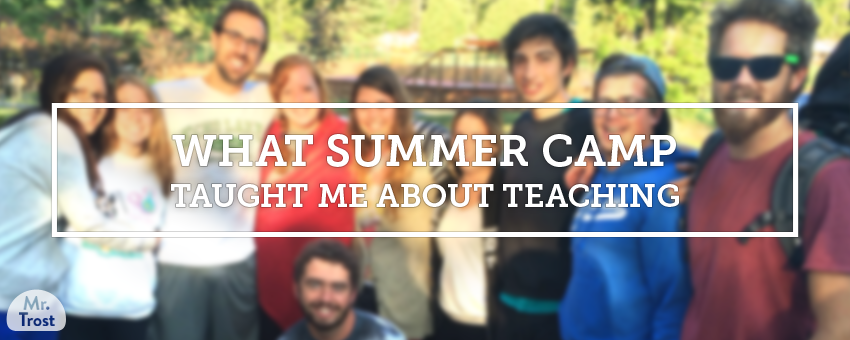What Summer Camp Taught Me About Teaching (Part 1 of 2) by Alex Trost
Working at camp is a unique experience that is beneficial for those going into any profession, teaching in particular. One of our own, Alex Trost, has recently published a two-part article which shows how he incorporates the things that he learns over the summer at Camp Echo Lake into teaching his third grade class.
Alex has been with us for the past two summers. He was a Cabin Specialist with the Frosh Boys in 2013, and last summer he was the Group Leader for the Upper Junior Boys. Thoughtful, insightful, creative and compassionate are just some of the traits that make Alex a valued staff member.
Alex’s article, What Summer Camp Taught Me About Teaching (Part 1), can be read in its entirety below. Part 2 of the article will be published tomorrow on the Camp Echo Lake blog. If you’d like to learn more about Alex, check out his blog at www.MrTrost.com.
What Summer Camp Taught Me About Teaching (Part 1)
By Alex Trost
I have been working with children since I was a teenager and arguably still a child myself. Through all of my years spent with children, I can confidently say that the two summers I spent as a camp counselor I learned the most about working with and relating to children. It is one thing to know how to utilize the best methods to educate children; Temple University provided me with that facet of my education. It is another to be able to understand children’s emotions, empathize with them, and understand how to intrinsically motivate them. Camp Echo Lake taught me more about that than I had ever expected.
Camp Echo Lake is a sleep away summer camp near Lake George, NY, in the beautiful Adirondack mountains. The slogan that they have screenprinted on the back of every staff shirt is “Dedicated to human development.” They stand by that. Counselor orientation lasts for 2 weeks, after which the kids come and stay for a continuous 7 weeks, resulting in a 9 week crash course in best practices for developing children. It is demanding and intense, as the counselors are responsible for living alongside the campers in the cabins, getting them up in the morning, taking them to every meal and activity, and putting them down for bed. Counseling is a full time job, as you’re tasked with keeping control of your group from 7 a.m.-10 p.m. when they (hopefully) fall asleep.
My first summer at camp I worked as a Cabin Specialist watching over a great group of eight year-old boys. We had a great team of eight counselors and were able to give the kids a terrific summer. My second summer I was asked back as a Group Leader, and was able to lead a phenomenal group of 26 kids and 8 staff through all kinds of experiences. Taking care of 26 boys as we traveled around a massive camp in the open Adirondacks prepared me well for managing 25 students in a small Philadelphia classroom.
Cabin Management
The first difference I observed between camp and teaching is that counselors are not only encouraged, but required to befriend the children. Your role is to keep the children safe and having fun. Teachers do not hold friendship as their top priority, but instead need to do whatever is possible to help the student achieve academically. Both of these jobs, however, require great skill in keeping the children behaving and doing what needs to be done. Because of camp I have developed an engaging and positive approach to classroom management.
Motivation
Just as kids don’t generally want to take tests or do math, I can tell you they also don’t enjoy sweeping cabins, making their beds, or picking up the trash around the camp grounds. With the right kind of motivation and management, I have found that all of this is possible. Not only will kids do these things, but they will take pride in the job they do, sometimes asking for more responsibilities once they have mastered those given. Camp has taught me how to make sweeping dirt and brushing teeth fun. Anything is possible.
We Set the Tempo
We were taught in orientation that the mood of the group is generally set by the counselors. If the counselors are upbeat, optimistic and happy about the day, the feeling spreads to the children and lifts up the whole group. Even more, if the counselors are energized, fun, crazy, and comfortable to show everyone their “true selves,” the campers do the same. Because of this safe and judgement free environment, campers sing, dance and perform on stage, or sometimes just in their cabins. As the staff, we made sure to model for the kids how we wanted them to behave, while being as silly and carefree as we wanted. The end result was a camp where every child feels comfortable to show who they truly are.
I strive to bring this to class every day, sharing my excitement for the day, for certain topics, and for whatever classwork we are going to doing. I see immediate response when I bring my own energy to my lessons and ask my kids to do the same. Children are overflowing with energy and I find they are much more likely to engage with lessons when they are able to burn off some of that energy.
I found so much to be said about what I’ve gained from working at camp that I had to split it into two posts. Stay tuned for part two!


